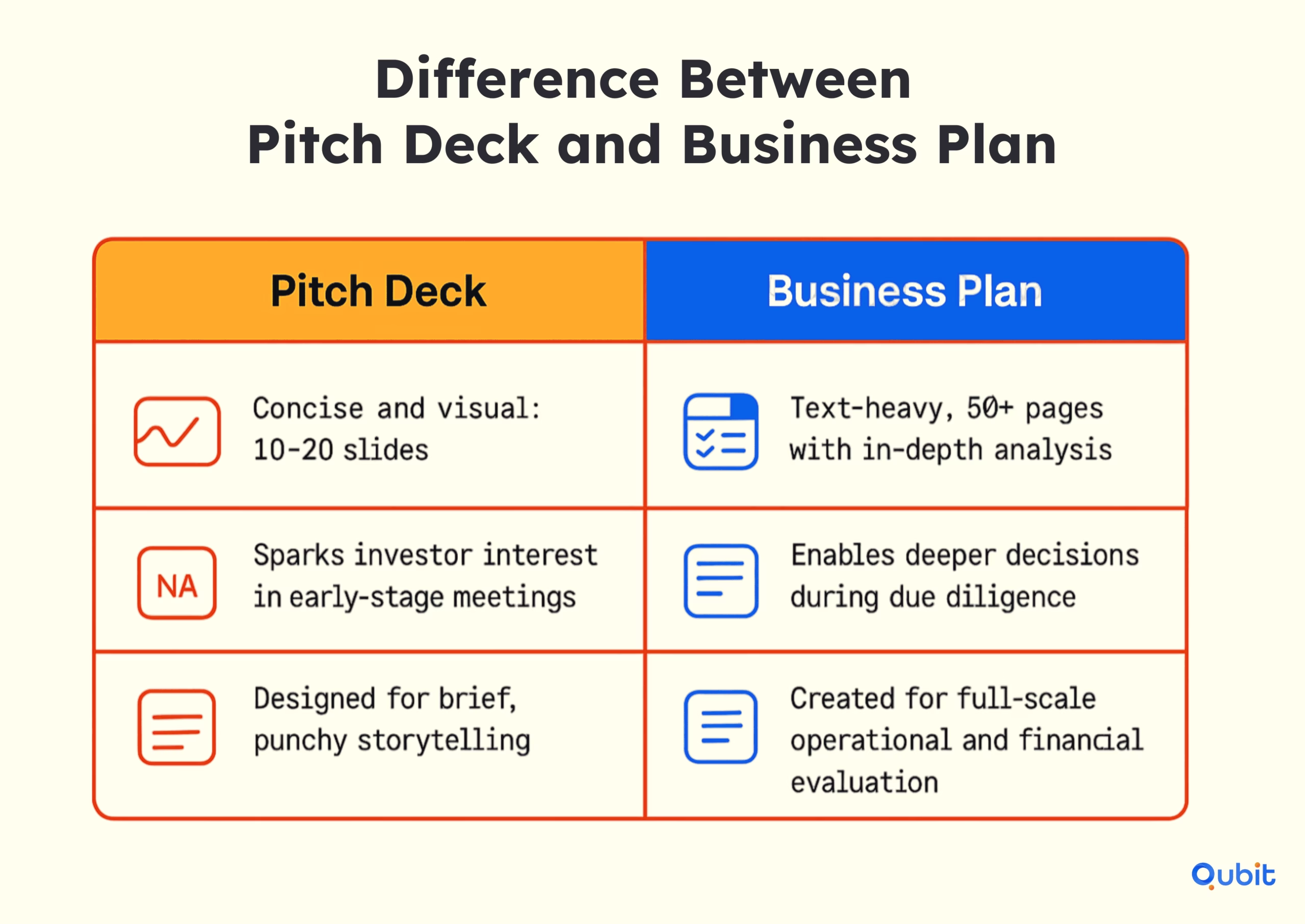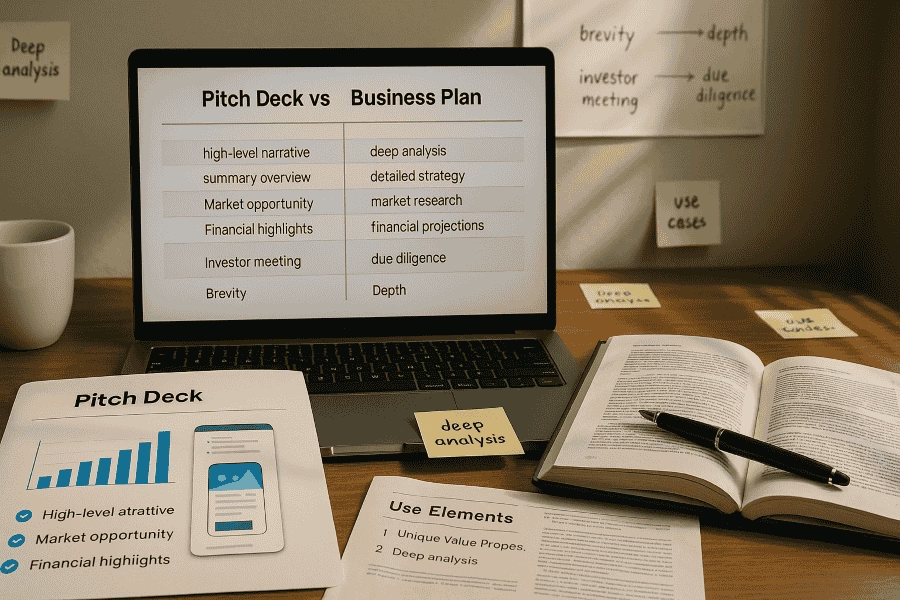When it comes to presenting your business idea, choosing the right format can make all the difference. Both pitch decks and business plans serve as essential tools for communicating your vision, but they cater to distinct audiences and purposes. A pitch deck is a concise, visually engaging presentation designed to capture attention, often used in investor meetings. On the other hand, a business plan dives deeper into operational details, offering a comprehensive roadmap for your venture.
Your review of how to create a pitch deck outlines a comprehensive framework for designing presentations that secure funding, setting a foundational context for further exploration. This article will compare these tools, blending insights and trends to help you decide which is right for your needs. Let’s jump right in!
What You Need to Know About Pitch Decks and Business Plans
While both serve critical roles, pitch deck and business plan cater to distinct purposes and audiences. Let's see how:
Pitch Decks: A Visual Snapshot
Pitch decks are concise, visually engaging presentations designed to grab the attention of investors quickly. They typically include slides that highlight key aspects of the business, such as the value proposition, market opportunity, and financial projections. The goal is to deliver a compelling narrative in a short timeframe, often during meetings or pitches.
Modern tools like slide deck AI are revolutionizing pitch deck creation, enabling entrepreneurs to craft polished, professional presentations with minimal effort. These technologies streamline the design process, ensuring that the visuals are as impactful as the content itself.
Business Plans: A Comprehensive Roadmap
On the other hand, business plans provide a detailed, in-depth analysis of the company’s operational and financial strategies. They are typically longer documents that outline everything from market research and competitive analysis to organizational structure and revenue models. Business plans are often used internally to guide decision-making or externally to secure loans and partnerships.
Unlike pitch decks, business plans focus less on visual appeal and more on thorough documentation. They serve as a blueprint for the company’s long-term goals and strategies, offering stakeholders a complete picture of the business.
Key Differences Between Pitch Deck and Business Plan
- Format: Pitch decks are concise and visually driven, while business plans are text-heavy and comprehensive.
- Purpose: Pitch decks aim to spark interest, whereas business plans provide detailed insights for deeper evaluation.
- Audience: Pitch decks target investors during initial meetings; business plans are for stakeholders requiring extensive information.
Both tools are indispensable, but knowing when to use each can significantly impact your business’s success.
How Pitch Decks and Business Plans Differ
When presenting a business idea, understanding the distinction between pitch decks and business plans is crucial. While both serve to communicate your vision, they differ significantly in format, purpose, and audience expectations.

Pitch Decks: Concise and Visual
Pitch decks are designed for quick, impactful presentations, typically consisting of 10–20 slides. Their primary goal is to capture attention and provide a high-level overview of your business. As per Venngage statistic on slide counts, the simplicity of pitch decks is a driving factor in early-stage funding. These presentations rely heavily on visual appeal, using charts, infographics, and concise text to summarize key points.
For example, a pitch deck might include slides on market opportunity, product features, and financial projections, but avoids diving into granular details. Referencing Upmetrics insight on high-value summaries underscores the necessity of condensing complex data for quick investor review. This format is ideal for initial meetings with investors who prefer a snapshot of your business rather than exhaustive documentation.
Business Plans: Comprehensive and Detailed
In contrast, business plans are far more detailed, often exceeding 100 pages. They provide an in-depth analysis of your business model, operational strategies, market research, and financial forecasts. According to Startupsmagazine on business plans vs pitch decks, the choice between these formats often hinges on the level of detail investors expect.
A business plan might include sections on organizational structure, competitor analysis, and risk management, offering a complete roadmap for your venture. While pitch decks focus on high-level information, business plans cater to stakeholders who require thorough documentation before making decisions.
Key Differences in Audience Expectations
Investors and stakeholders often have different expectations depending on the format. Early-stage investors typically favor pitch decks for their brevity and visual clarity, while later-stage investors or lenders may require the comprehensive insights provided by a business plan. For a deeper side-by-side look, Pitchdeckfire comparison of pitch deck vs business plan outlines the advantages each format brings.
The Role of AI in Streamlining Creation
Modern tools like AI slide deck generators simplify the creation process for both formats. As noted in the SlidesAI blog on pitch deck vs business plan, AI tools can accelerate the creation process without sacrificing clarity. This technology ensures that pitch decks remain visually engaging while business plans retain their depth and precision.
For additional insights on how pitch materials differ across varying investor frameworks, explore our article on "pitch deck vs PitchBook."
Understanding these differences helps entrepreneurs tailor their approach to meet specific investor needs, ensuring their message is both impactful and informative.
How to Create Pitch Decks That Work
Crafting a pitch deck that resonates with investors requires a blend of strategy and storytelling. Pitch decks are designed to provide a concise, visual snapshot of your business, aiming to secure investor interest and follow-up meetings. To achieve this, it’s essential to structure your deck with key slides that highlight your company’s vision, market opportunity, and financial projections.
Structuring Your Pitch Deck
Start with a Compelling Vision
The opening slide should captivate your audience by clearly presenting your company’s mission and vision. This sets the tone for the rest of the presentation and establishes a strong first impression.Highlight Market Opportunity
Investors want to understand the size and potential of the market you’re targeting. A well-crafted market size slide for pitch deck presentations can enhance your narrative by incorporating robust data visualizations. This approach ensures your market research is both clear and impactful.Present Financial Projections
Financial slides are critical for demonstrating the viability of your business model. Use concise charts and figures to showcase revenue forecasts, profit margins, and growth potential.
Tools to Simplify Pitch Deck Creation
Designing a professional pitch deck doesn’t have to be overwhelming. Tools like Canva pitch deck templates offer customizable solutions for startups, making it easier to create visually appealing slides without extensive design expertise. For founders seeking advanced features, the Slidebean pitch deck creation platform provides AI-assisted tools that auto-arrange slide elements, ensuring both efficiency and cohesiveness.
How to Build Business Plans That Deliver Results
A well-crafted business plan acts as a strategic blueprint, guiding both internal operations and external funding efforts. These documents are more than just formalities—they provide exhaustive detail on operational strategies, market analyses, and financial projections. By presenting a clear roadmap, business plans empower organizations to align their goals and secure investor confidence.
Key Components of a Result-Oriented Business Plan
Operational Strategies
A business plan outlines the day-to-day processes that drive success. From supply chain management to staffing plans, these operational details ensure that every aspect of the business is accounted for. This level of precision not only supports internal planning but also demonstrates organizational credibility to stakeholders.Market Analysis
Understanding the competitive landscape is essential for growth. A robust market analysis identifies target audiences, evaluates competitors, and highlights opportunities for differentiation. This section of the plan showcases the company’s ability to adapt and thrive in its industry.Financial Projections
Financial data is the backbone of any business plan. Accurate projections of revenue, expenses, and profitability provide a realistic picture of the company’s financial health. These figures are critical for attracting investors and securing funding.
For startups, integrating these elements into a cohesive plan can be particularly impactful. An analysis of the business portfolio for startups provides insights into strategies tailored for startup presentations, adding depth to your understanding of effective storytelling for investors. By combining operational strategies, market insights, and financial forecasts, business plans serve as foundational tools for long-term growth.
How to Choose Between Pitch Decks and Business Plans
Pitch decks and business plans serve distinct purposes, and understanding their strengths can help you tailor your approach effectively. Selecting the right tool to present your business idea can significantly impact how investors perceive your venture.
Pitch Decks: Capturing Initial Interest
Pitch decks are concise, visually appealing presentations designed to grab attention quickly. They are ideal for early-stage investor meetings or situations where time is limited. For example, in the case study "Startup Success with Pitch Decks," a founder secured $1M in funding by delivering a succinct and visually striking presentation. This format works best when your goal is to spark interest and initiate further discussions.
Business Plans: Providing Detailed Insights
When a more formal and comprehensive approach is required, business plans are the preferred choice. These documents offer in-depth narratives, including financial projections, operational strategies, and market analysis. As seen in "Business Plan for Long-Term Growth," a company successfully obtained a $5M loan by presenting detailed financial and operational data. Business plans are particularly effective for long-term funding applications or partnerships requiring thorough due diligence.
The Hybrid Approach: Combining Strengths
An emerging trend is the hybrid approach, which merges the visual clarity of pitch decks with the depth of business plans. This dual-purpose solution caters to diverse investor preferences, offering both quick insights and detailed data. Businesses adopting this strategy can engage investors more comprehensively, balancing initial interest with substantive follow-up information.
Understanding when to use each format—or a combination of both—can enhance your ability to communicate your vision effectively.
Conclusion
Whether it’s a concise pitch deck or a comprehensive business plan, understanding their differences ensures effective communication with investors. Each format serves a unique purpose, and aligning your choice with your objectives can make all the difference in securing funding.
If you're ready to take the next step, we at Qubit Capital can assist with our Investor Outreach service. Let’s work together to secure those investor meetings and propel your startup forward.
Key Takeaways
- Pitch decks hook early-stage investors with concise visuals.
- Business plans provide detailed roadmaps and projections.
- Choose the right format and level of detail for your audience.
- AI tools (e.g., slide-deck generators) speed up creation.
- A hybrid deck-plan approach combines brevity and depth.
Frequently asked Questions
Is a pitch deck the same as a business plan?
No,a pitch deck is a concise slide presentation you use to spark investor interest, while a business plan is an in-depth written document that covers your strategy, market research, and financials.


 Back
Back



